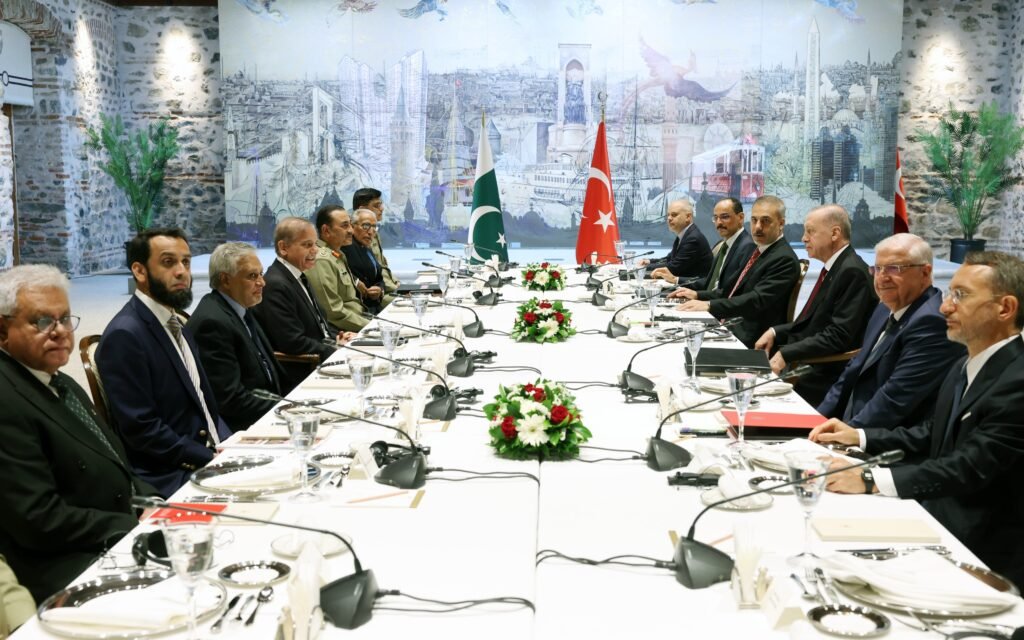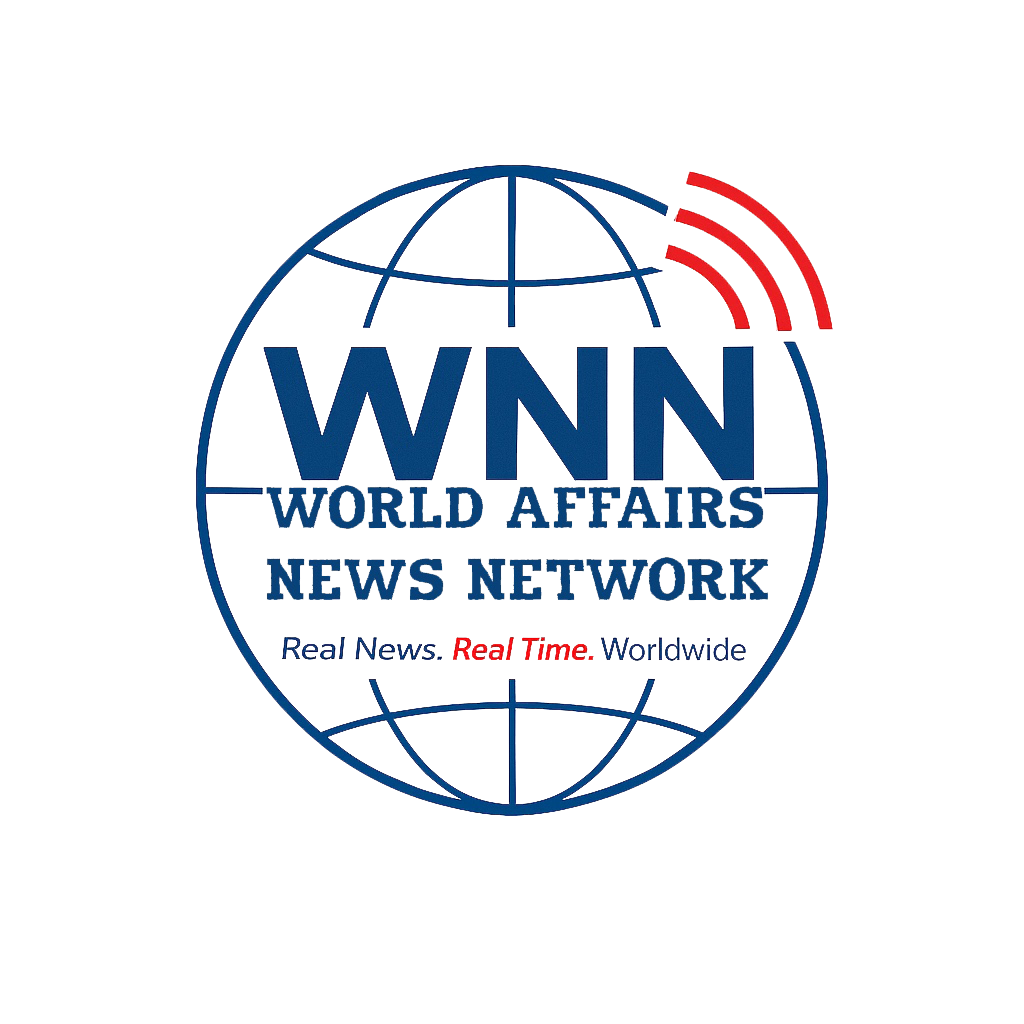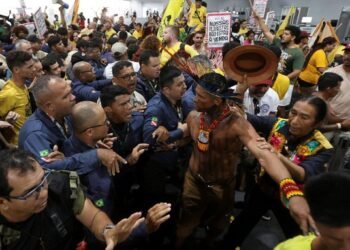ISTANBUL/ NEW DELHI: Turkish President Recep Tayyip Erdoğan and Pakistani Prime Minister Shehbaz Sharif concluded wide-ranging bilateral talks in Istanbul on Sunday, reinforcing a strategic realignment that reflects the Global South’s shifting geopolitical posture. As traditional power centers in Washington and Brussels recalibrate, middle powers like Turkey and Pakistan are asserting a more autonomous and interconnected role, with implications stretching from the Eastern Mediterranean to the Hindu Kush.
Fahrettin Altun, Director of Communications for the Turkish Presidency, stated on X (formerly Twitter) that the talks addressed bilateral cooperation, regional developments, and counterterrorism – but the real significance lies in how this dialogue fits into a broader reconfiguration of power among non-Western states.
A New Axis Within the Global South?
The Erdogan-Sharif meeting marks more than just another diplomatic checkpoint. It reflects a broader trend across the Global South — where states disillusioned with Western-dominated global governance are forging new cross-regional partnerships. The convergence between Ankara and Islamabad highlights the rise of “middle-power multilateralism” — where emerging players coordinate regionally and interregionally to shape the international agenda.

As both countries juggle relations with China, the Gulf, Russia, and the West, they are increasingly looking to one another — and to others in the Global South — to reduce dependency on Western financial, military, and diplomatic structures. The Istanbul meeting, therefore, may signal a deliberate South-South pivot in strategic alignment, particularly amid growing instability in adjacent theatres like Afghanistan, Palestine, and Syria.
Syria Breakthrough: From Isolation to Reintegration
The timing of the Sharif visit – coming just one day after Erdoğan’s surprise meeting with Syrian President Ahmed al-Sharaa – is geopolitically telling. After over a decade of hostility, Ankara’s rapprochement with Damascus signals a dramatic recalibration of its Levantine strategy. It also aligns with broader trends within the Global South, where regional actors are increasingly prioritizing pragmatic engagement over ideologically driven isolation.
The recent U.S. and EU moves to lift sanctions on Syria — with Turkey’s quiet encouragement — suggest a weakening of Western monopoly over post-conflict normalization processes. This development also reflects a fundamental shift: Syria’s reintegration is being shaped more by Ankara, Moscow, Tehran, and now increasingly by South Asian actors like Islamabad, than by Euro-American decision-making.
Kurdish Realignment: The PKK-YPG Equation Enters New Phase
Simultaneously, covert negotiations between Turkish intelligence and Damascus — reportedly addressing the disarmament and possible reintegration of the Syrian Kurdish YPG — could reshape regional security architecture. Turkey’s demand to dismantle the YPG, which it sees as an extension of the PKK, aligns with reports that the PKK is preparing to dissolve its armed wing. If formalized, this would mark one of the most significant counterterrorism and conflict-resolution breakthroughs in the region in years.
This shift also dovetails with broader security priorities shared by Pakistan, which faces parallel challenges from cross-border militancy in Afghanistan and Baluchistan. Thus, Ankara and Islamabad may be moving toward a more integrated regional counterterrorism doctrine — one that could eventually bypass traditional Western frameworks like NATO-led missions or U.S.-centric coalitions.
Afghanistan and Kashmir: Converging Interests in an Unstable Neighborhood
For Pakistan, the Istanbul summit offers a platform to internationalize its regional anxieties: the uncertain trajectory of Taliban-ruled Afghanistan, the simmering Kashmir dispute, and India’s growing alignment with Western Indo-Pacific strategies. Turkey, for its part, has signaled growing interest in South Asian security affairs, often echoing Islamabad’s positions on Kashmir in international forums.
Both countries also share a strong pro-Palestinian stance, and their coordination could lead to a more unified Islamic bloc response to ongoing atrocities in Gaza — potentially recalibrating the internal dynamics of the Organisation of Islamic Cooperation (OIC) and enhancing South-South coordination on humanitarian diplomacy.
Economic and Technological Cooperation: From Rhetoric to Reality
The summit also explored enhanced cooperation in defense production, energy transition, and digital infrastructure. Pakistan has shown interest in Turkey’s Bayraktar drones and naval platforms, while Ankara is seeking Pakistani collaboration in energy corridors connecting Central Asia and the Middle East.
This evolving economic dimension fits into a larger trend: the creation of alternative trade, tech, and energy linkages within the Global South — designed to insulate states from the volatility of Western-led systems such as SWIFT, the WTO, and dollar-denominated oil markets.
The Global South in Transition: Toward Post-Western Multipolarity
The Erdogan-Sharif dialogue must be seen within the framework of an ongoing geopolitical realignment that defines the Global South’s strategic coming-of-age. These are not isolated interactions, but part of a larger pattern — mirrored in rising BRICS+ coordination, greater African-Arab-Asian trade integration, and the creation of new South-led financial institutions.
Turkey and Pakistan, both situated at key civilizational intersections, are now proactively shaping the emerging contours of multipolarity — not merely as regional actors, but as agenda-setters in a post-Western order. Their cooperation may still be in the early stages, but the architecture is forming: one that blends security pragmatism with ideological solidarity, and economic partnership with geopolitical assertiveness.
Istanbul as a Diplomatic Pivot Point
What transpired in Istanbul is far more than a bilateral reaffirmation; it is a microcosm of the Global South’s transformation from policy takers to power brokers. As Western hegemony faces structural limits, states like Turkey and Pakistan are no longer waiting to be invited to the table — they are building their own.
In an increasingly fragmented world, this South-South convergence offers a glimpse of a parallel system of cooperation — one that may redefine the strategic map not just of the Middle East or South Asia, but of the 21st century international order.
–By Daren Butler, Huseyin Hayatsever, and Dr. Shahid Siddiqui
WATCH, LIKE & SUBSCRIBE CHANNEL FOR REGULAR UPDATED



















